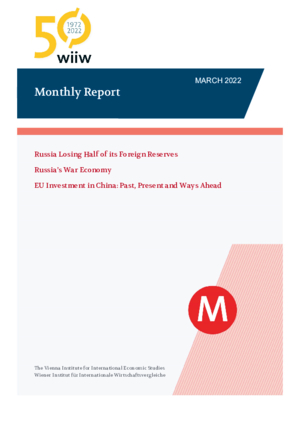Monthly Report No. 03/2022
Vasily Astrov, Vladislav L. Inozemtsev and Nina Vujanović
wiiw Monthly Report No. 3, March 2022
47 pages including 1 Table and 29 Figures
- Chart of the Month: Russia losing half of its foreign reserves
by Vasily Astrov
- Russia’s war economy
by Vladislav Inozemtsev
Following the harsh economic sanctions imposed by the West, the war-time economic policy adopted by Russia will shape its economy for at least the next six months. It involves, among other things, the discriminatory treatment of foreigners and foreign-based entities from ‘unfriendly countries’, the creation of a de facto two-tier banking system, a separation of the rouble and foreign currency markets, and possibly the expropriation of foreign-owned property. It will not, however, forestall the most serious economic crisis in the history of modern Russia.
- EU investment in China: past, present and ways ahead
by Nina Vujanović
Its significant economic reforms and the opening up of its markets have rendered China one of the largest trade players in the world. However, EU FDI in China has been relatively modest. The preferential treatment received by state-owned enterprises and conditions stipulating the transfer of technology remain major obstacles to FDI. Implementation of the Comprehensive Agreement on Investment with the EU and the Regional Comprehensive Economic Partnership agreement with other Asian and Pacific countries may, however, change EU investment patterns in China in the future.
- Monthly and quarterly statistics for Central, East and Southeast Europe
Reference to wiiw databases: wiiw Annual Database, wiiw Monthly Database, wiiw FDI Database
Keywords: foreign exchange reserves, economic sanctions, banking sector, foreign exchange, stock market, foreign property, foreign direct investment, Comprehensive Agreement on Investment, FDI regulatory restrictiveness
Countries covered: China, EU, Russia
Research Areas: Macroeconomic Analysis and Policy, International Trade, Competitiveness and FDI
